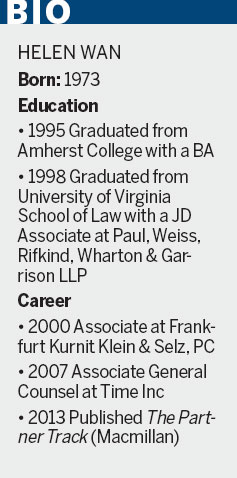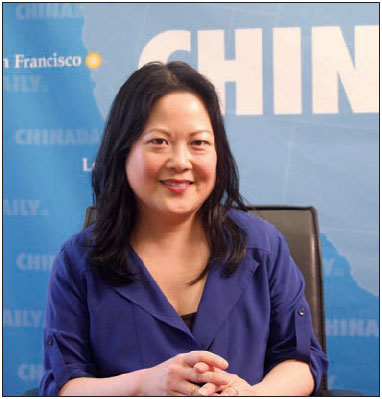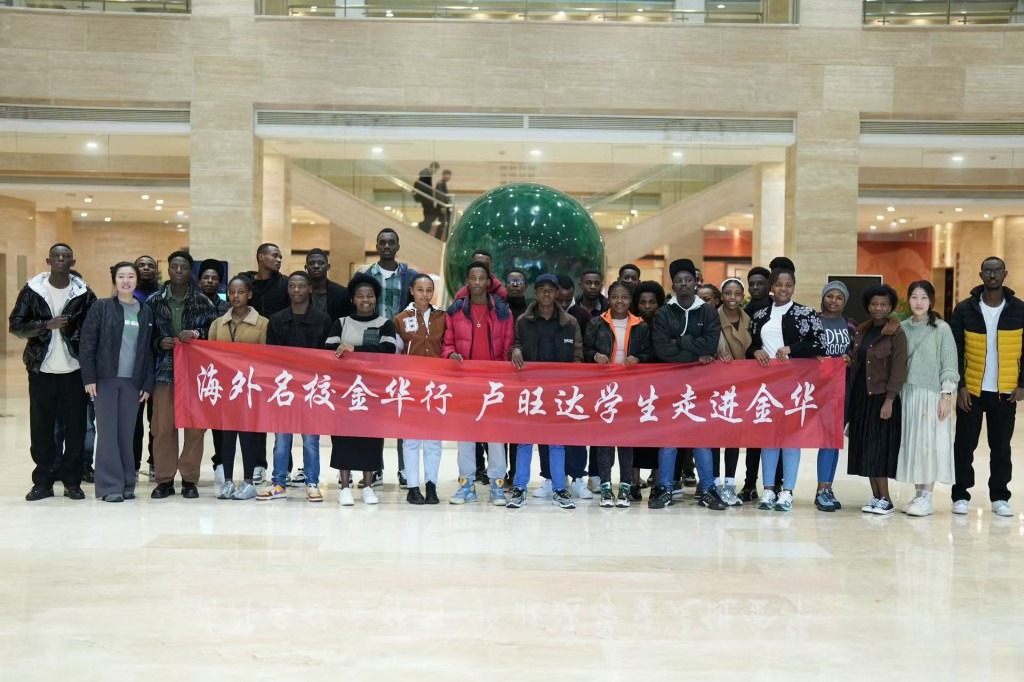Helen Wan: Writing and living a 'uniquely American Dream story'

When Helen Wan started writing a book more than a decade ago, she thought it would be a collection of short personal essays about her experiences in the work force as someone who occupied not just one category of "outsider" status, but two: woman and minority.
"I specifically remember trying to go into bookstores to find a book about how either a woman or a minority - or even better, a woman of color, an Asian American woman - can navigate corporate culture authentically and successfully, but I could not find one," Wan said.
So she decided to write one.
Wan juggled writing as she worked in the corporate department of Paul, Weiss, Rifkind, Wharton & Garrison LLP, her first job after graduating from the University of Virginia Law School. After putting together a 100-page manuscript, she submitted it to a handful of literary agents.
"Soundly rejected," she said. "It did not get anywhere."
The agents liked the style and the voice of Wan's writing, but they said it would be hard to sell a book written by an unknown 25-year-old about toiling away at a law firm, especially if the stories were personal essays.

If the book were redone as a fiction piece, she was told, the reaction might be very different.
"That was advice that I did not take for a very, very long time, because I was a full-time associate at Paul Weiss and I was thinking, 'Oh my goodness, it took me so long to put together 100 pages of non-fiction, how on earth am I going to find time to turn it into fiction?!'" she said.
But she did. Now it was about a young Chinese-American lawyer called Ingrid Yung, and the feedback fell into two categories. Agents wanted Wan to make the book much more ethnically-focused than it was, or she had to take out the her character's ethnicity.
"They said to me, 'We don't get it. Is this supposed to be an ethnic novel? If so, the book needs to be much more 'Chinese-y',' Wan said. "Or, they said, 'If you can't make it more ethnic, take the ethnicity out. Can you just make it about a white woman?'"
Wan, who grew up in the suburbs of Washington, said she wasn't willing to write about her protagonist getting sent to Beijing - "having all these crazy, exotic adventures" - and rewriting it from the point of view of a blonde woman was not an option for her.
"This is a uniquely American story, it's a uniquely American Dream story," she said. "My whole purpose was that there were not enough books out there - particularly novels - featuring strong Chinese-American female protagonists, and that was a very important goal in getting this book published."
Wan's The Partner Track is a fictional account of how a female Chinese-American lawyer tries to navigate the world of corporate culture at a time when company diversity meant having "Dumpling Day" in the company cafeteria. The main character, Yung, is on her way to becoming a partner at the firm she works at - the first minority to do so - and dealing with how being on the "partner track" reveals much about the lack of resources available to women, and particularly women of color.
Diversity at the fictional law firm where Yung works is never a problem until a culturally-insensitive skit makes its way to a company party, and a diversity committee is set up at the firm to solve the problem.
In her 15 years of practicing the law, Wan said that diversity has gotten better and companies trying to diversify didn't resort to token solutions like bringing on a diversity committee. But she admitted that "change is very slow coming."
After working at Paul Weiss, she spent seven years at Frankfurt Kurnit Klein & Selz before becoming associate general counsel at Time Inc in 2007.
"I actually think that the scenes that take place in the novel could very well still happen today, and do, by the way," she said. "They happen with less frequency, but still do happen."
Big firms are perhaps savvier in dealing with diversity issues than they used to be, Wan said, focusing more on cultivating diversity presence in the executive level, training employees on how to build organic relationships with the right mentors and sponsors at the company.

But some of the problems that she noticed as a young associate starting out in the legal world are still present today.
The book was published in September to positive response and was discussed in small communities across the US. But through word of mouth and social media, support for the book grew and Wan was invited to speak about diversity and the workforce, using her book to start dialogue about inclusive environments, which she said she found incredibly flattering.
Eventually, the response grew so large that Wan decided to take a year off from her work at Time Inc and focus on promoting the book and working on a second novel, which does not yet have a release date.
Wan said that she has even gotten mail from readers in China who read the book in English and liked it so much that they offered to translate it into Chinese.
| Helen Wan, associate general counsel at Time Inc, released her debut novel The Partner Track in September. In February, Wan was awarded the 2014 Achievement Award by the Chinese Business Lawyers Association. Amy He / China Daily |
(China Daily USA 03/18/2014 page2)
Today's Top News
- China's central bank outlines monetary priorities for 2025
- 8 killed, 15 injured in market fire in North China's Hebei
- IoT new engine of socioeconomic development
- Visit highlights strong ties with Africa
- Xi sends congratulations to new Georgian president
- No letup in battle against corruption































